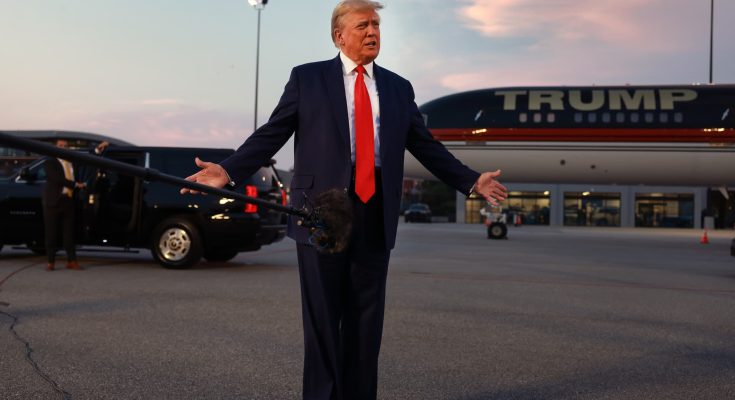Donald Trump delivered a speech in Atlanta, Georgia, that quickly became notable for all the wrong reasons. The event was marked by a visibly empty section in the auditorium, which Trump promptly blamed on the school that controls the venue. Throughout the speech, Trump made several disjointed and controversial remarks, leaving many to question the coherence and impact of his address.

One of the most glaring issues was the significant number of empty seats at the venue. Trump claimed that the school’s administration had prevented an additional thousand people from entering the auditorium, attributing the lack of attendance to their actions. This excuse did little to quell the concerns of those observing the event, as the sparse crowd was a stark contrast to the packed stadiums seen at other political rallies, such as those held by Vice President Kamala Harris.
The speech itself was filled with moments where Trump appeared to struggle with his words and ideas. For instance, he awkwardly stumbled over the term “mass amnesty,” and referred to the fictional character Hannibal Lecter as “Dr. Hannabor.” These verbal glitches were frequent, adding to the overall sense of confusion that pervaded his address.
In addition to the verbal missteps, Trump spent a significant portion of his speech attacking the school that hosted the event. He criticized the administration for allegedly blocking more attendees and even suggested that this incident foreshadowed potential voter suppression on Election Day. This accusation, however, seemed to lack substantive evidence and was viewed by many as an attempt to deflect from the poor turnout.
Trump’s speech also veered into bizarre territory when he congratulated Russian President Vladimir Putin on a recent prisoner swap, a move that many saw as deeply inappropriate given the geopolitical tensions between the United States and Russia. Furthermore, Trump repeatedly criticized President Biden, despite Biden not being his current political opponent, and claimed that Biden was “choking like a dog”—a phrase he reiterated several times during the event.
The former president didn’t stop at attacking Democrats; he also took aim at members of his own party. Trump criticized Georgia Governor Brian Kemp, a fellow Republican, and even took swipes at former Republican presidential candidate Mitt Romney and former Vice Presidential candidate Paul Ryan. These attacks on his party members further highlighted the divisive nature of Trump’s rhetoric.
Another point of controversy was Trump’s remarks about Vice President Kamala Harris, whom he repeatedly insulted by questioning her intelligence and mispronouncing her name. He even made the unfounded claim that Harris would seek to remove the phrase “Merry Christmas” from American culture if elected president. These comments were seen as not only disrespectful but also indicative of Trump’s continued reliance on inflammatory and baseless claims.

Adding to the strangeness of the event, Trump claimed to support electric cars due to an endorsement from Elon Musk, despite previously expressing disdain for electric vehicles. This sudden shift in stance only added to the confusion surrounding his speech.
The event concluded with Trump promoting a right-wing conspiracy theory involving an Algerian boxer and attacking popular musicians like Bruce Springsteen, further solidifying the speech as one of his most erratic and controversial public appearances to date.
Donald Trump’s speech in Atlanta was marred by empty seats, verbal glitches, and a series of controversial and unfounded claims. The event has been widely criticized as a disorganized and divisive display, raising concerns about the former president’s ability to effectively communicate and engage with his audience.



